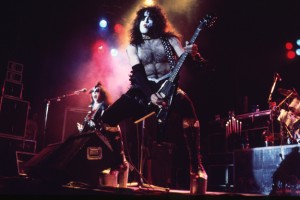Dave Lifton | Ultimate Classic Rock

Michael Ochs
Few bands in rock history have had critical appeal in disproportionate amounts to their commercial success as Kiss. However, two writers, J.M. Blaine and Chuck Klosterman, have long treated the band with genuine love and seriousness, and recently got together to talk about their face-painted heroes.
The fun and lively discussion, which ran over three parts at the Nervous Breakdown, had its origins after Blaine had finished writing a book and was obsessing over old metal videos. Wanting to talk with someone who felt the same way, he contacted Klosterman, who once wrote a book called ‘Fargo Rock City,’ about growing up a metal fan in North Dakota in the ’80s.
One of the most vivid memories both men had of Kiss was seeing the band profiled on ABC’s ’20/20′ program in 1979. “I remember hearing Gene [Simmons] say, ‘You can be whoever you want to be. Don’t let anyone tell you who you are or what you can’t do,’” Blaine said. “For a kid with a young single mother, living in a one-horse town — where the best you could hope for was a high school diploma and a job at the paper mill — that message combined with the music and the look, was incredibly empowering.”
The pair soon got into an entertaining discussion about what they believe really caused the breakup of the original Kiss lineup. Blaine credits their downfall to two events: “First, (drummer) Peter (Criss)’s ‘Beth’ is the band’s only number one smash. Second, Ace Frehley smokes Paul and Gene with his solo LP (All four band members released solo albums on the same day in 1978.) Not even close. When you empower the underdog, good things can happen if the alpha dog’s ego is secure. If the underdog is supported and encouraged with good boundaries the team as a whole can rise to new heights because everybody is at their best. Theoretically, (1979′s) ‘Dynasty‘ should have been Kiss’s strongest release. But it wasn’t. Because I don’t think Paul and Gene could handle humility and apparently Peter and Ace couldn’t handle success.”
Klosterman takes a wider view of the issue: “If we’re talking objectively, I think the downfall of Kiss was the realization of their goals. Most bands want to be the Beatles but Kiss wanted to be Coca-Cola. Early in their career, the records aren’t selling but they portray themselves as being super-successful. Then it actually happens. They become obsessed with holding on to the market share and too conscious of what else was happening in music. Whether it’s disco or… I don’t know how we describe ‘Unmasked,’ this sort of pre-cursor to ’80s synth music? So they start overcompensating in order to be as successful as they had always claimed.”
Interesting theory, right? Once again we’ll remind you that you can — and should — read the full three-part interview over at Nervous Breakdown.
